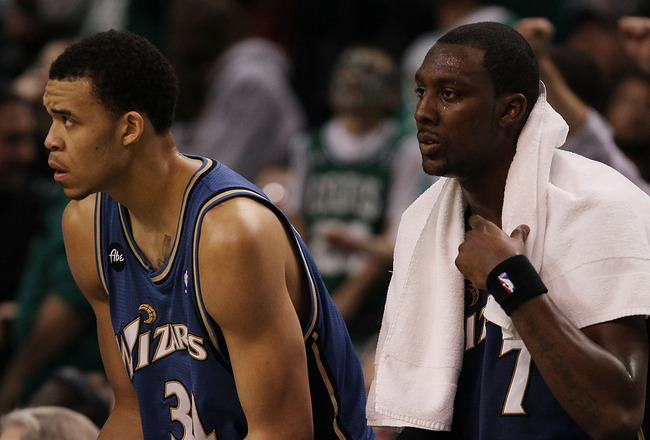
For those of us lucky enough to have the option of mobility, there’s a moment when you realize you need a change of scenery: a new job, a new city, a new social circle. The rhythms of your everyday life are too convenient, the interactions too typical—nothing has changed and it seems unlikely that they will, so perhaps it’s just better to move on and try somewhere new.
I’m thinking about this adult phenomenon as the Nets head to Denver tomorrow night, where two former Washington castaways—Andray Blatche and JaVale McGee—will play against each other in a radically new context (not for the first time, I should note). A year ago, they were both underachieving Wizards prone to goofing off, inconsistent play and the occasional fistfight, poster children for the perils of throwing young talent together and expecting things to automatically jell. Now, they’re indispensable bench elements of two playoff teams: McGee the game-changing transition weapon there for the block or alley oop, Blatche the instant offense capable of remapping shot charts with his unconventional but somehow effective shooting selection. Statistically, both players are having their best years ever, with career-high player efficiency ratings and improved numbers across the board. More importantly, they’ve been decoupled from the expectation of being a franchise player. No longer are they judged against the idea of what they might be, but against what they’re capable of right now—which, as it turns out, is plenty.
Both players came to Washington on the tail end of the Gilbert Arenas years, when the team’s ceiling had already been hit without the ownership’s realization. They were given big minutes and expected to play a big part going forward, but any sense of continuity was upset by the chaos of coaches coming and going, teammates getting suspended, and an imprecise, constantly redefined rebuilding plan. Were they expected to be veterans and mentor new Wizards like John Wall and Jan Vesely? Were they still works-in-progress? Did McGee deserve a big contract? Did Blatche deserve his? The situation seemed increasingly tense, with McGee’s mother memorably calling out the team for how they were coaching her son (a biased perspective, of course, but it’s not like her comments were out of line). Eventually, they were both given away: Blatche was amnestied, while McGee was unloaded in a multi-player trade to Denver.
It’s hard to get athletes to go on the record about how they really feel about a former team: There are too many things at stake, whether it’s social standing or a future contract, and the media has a long history of blowing things way out of proportion. However, Blatche has been increasingly candid after an initial reticence; he’s talked about his motivation to screw the Wizards salary cap, and even showed up to a Washington radio show to get chewed out something fearsome by the understandably bitter hosts. ”I’m trying to move on,” he said. “You know, it’s kind of hard to move on,” he said a moment later. Eventually, some enterprising reporter will get the story of how things really went down in a way that holds everyone accountable: player, coach, owner, organization, fanbase and whoever else. Still, it might take a while.
A few days ago, a spectacularly edited mixtape of high level high school prospect Andrew Wiggins’s senior season was dropped on the Internet, prompting Internet effusion over what might be if he weren’t limited by the NBA’s age restriction. While I’m wary over how pro ready we can deem a player based on his ability to crossover laughably overmatched 14 year olds, I feel like the more important question is judging how ready any teenager is to take care of himself. How ready for adult life were you at 18 or 19 or 20? Maturity is situation dependent—it’s not something that grows apropos of nothing, but from the specific experiences and lessons any particular person will go through.
“Duh,” you remark, but I’m not sure if there’s enough sympathy for how young players who haven’t had that mental transition are thrown into the machine. Blatche was drafted out of high school, while McGee left college after his sophomore year; I’m about the same age as them, but they’ve been working as millionaire employees of a multi-billion dollar industry for a combined 13 years. How did they handle it? It’s easy to laugh at the image of a Kwame Brown (another Washington castoff) who throws his suits in a corner, but who was telling him to do otherwise? Andrew Wiggins isn’t Kwame Brown or McGee or Blatche, and he could be very well ready to handle such adult considerations. But watching players like DeMarcus Cousins or Tyreke Evans struggle to get it together says something about the importance of where one’s formative adult experiences take place, and it’s little coincidence that McGee and Blatche perked up as soon as they got out of Washington.
I can’t speak to the frustration of being a Wizards fan and watching them plateau year after year, but I’m inclined to be sympathetic to any young adult’s journey toward maturity. Again, sometimes you’ve got to move on before you can move on, if you get what I mean—and pardon my inner sap, but it’s nice to see two undeniably entertaining and talented players finding their place in the league.